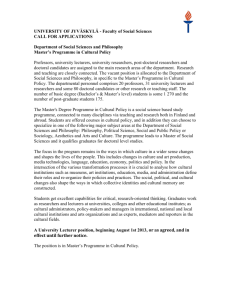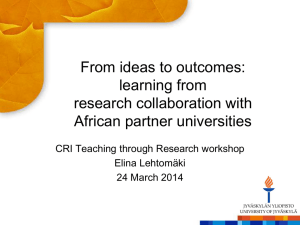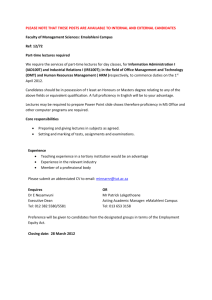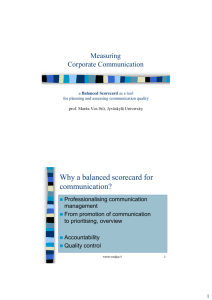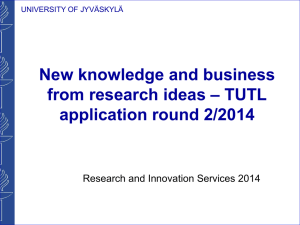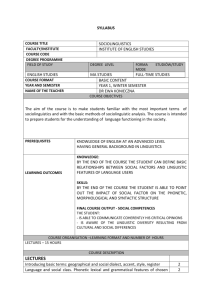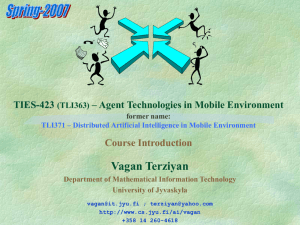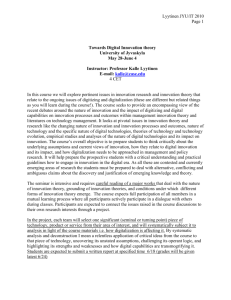Faculty of Information Technology
advertisement
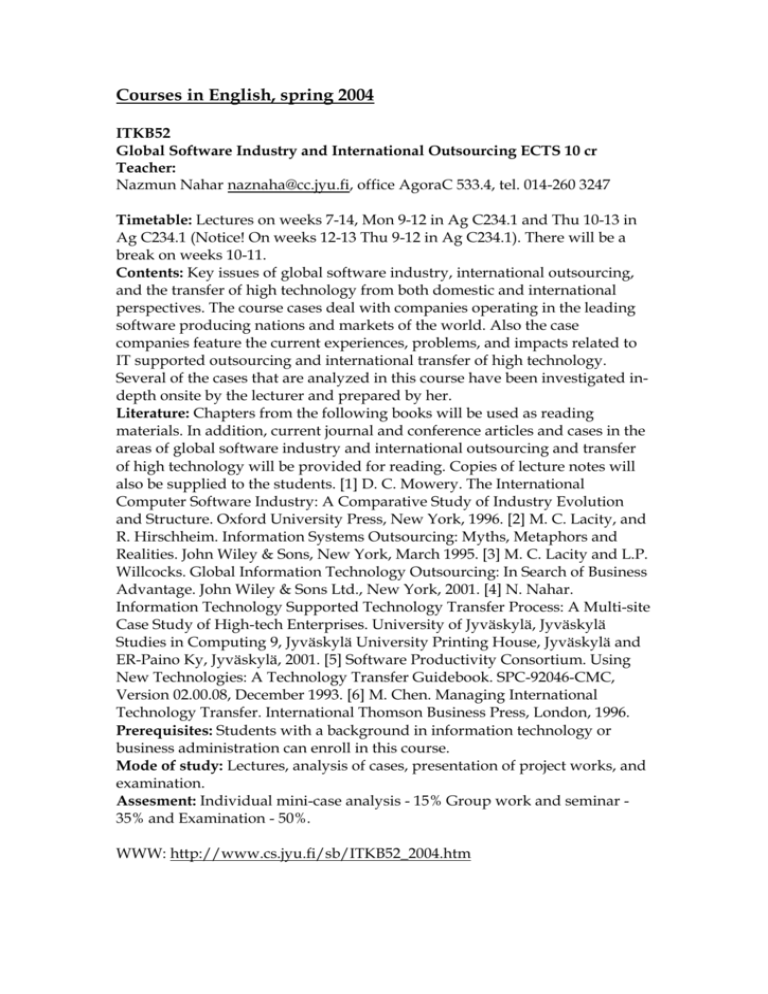
Courses in English, spring 2004 ITKB52 Global Software Industry and International Outsourcing ECTS 10 cr Teacher: Nazmun Nahar naznaha@cc.jyu.fi, office AgoraC 533.4, tel. 014-260 3247 Timetable: Lectures on weeks 7-14, Mon 9-12 in Ag C234.1 and Thu 10-13 in Ag C234.1 (Notice! On weeks 12-13 Thu 9-12 in Ag C234.1). There will be a break on weeks 10-11. Contents: Key issues of global software industry, international outsourcing, and the transfer of high technology from both domestic and international perspectives. The course cases deal with companies operating in the leading software producing nations and markets of the world. Also the case companies feature the current experiences, problems, and impacts related to IT supported outsourcing and international transfer of high technology. Several of the cases that are analyzed in this course have been investigated indepth onsite by the lecturer and prepared by her. Literature: Chapters from the following books will be used as reading materials. In addition, current journal and conference articles and cases in the areas of global software industry and international outsourcing and transfer of high technology will be provided for reading. Copies of lecture notes will also be supplied to the students. [1] D. C. Mowery. The International Computer Software Industry: A Comparative Study of Industry Evolution and Structure. Oxford University Press, New York, 1996. [2] M. C. Lacity, and R. Hirschheim. Information Systems Outsourcing: Myths, Metaphors and Realities. John Wiley & Sons, New York, March 1995. [3] M. C. Lacity and L.P. Willcocks. Global Information Technology Outsourcing: In Search of Business Advantage. John Wiley & Sons Ltd., New York, 2001. [4] N. Nahar. Information Technology Supported Technology Transfer Process: A Multi-site Case Study of High-tech Enterprises. University of Jyväskylä, Jyväskylä Studies in Computing 9, Jyväskylä University Printing House, Jyväskylä and ER-Paino Ky, Jyväskylä, 2001. [5] Software Productivity Consortium. Using New Technologies: A Technology Transfer Guidebook. SPC-92046-CMC, Version 02.00.08, December 1993. [6] M. Chen. Managing International Technology Transfer. International Thomson Business Press, London, 1996. Prerequisites: Students with a background in information technology or business administration can enroll in this course. Mode of study: Lectures, analysis of cases, presentation of project works, and examination. Assesment: Individual mini-case analysis - 15% Group work and seminar 35% and Examination - 50%. WWW: http://www.cs.jyu.fi/sb/ITKB52_2004.htm ITKB51 Requirement Management and Systems Engineering ECTS 8 cr Teacher: Zheying Zhang zhezhan@cc.jyu.fi office AgoraC 533.2, tel. 014-260 2540 Timetable: Lectures on weeks 5-12, Mon 16-18 and Thu 14-16 in Ag C234.1. Contents: Requirements must drive systems development. Systems engineering (SE) is the process of managing user and stakeholder requirements to deliver the correct system. This course introduces the requirements engineering (RE) field, provides a process-oriented overview of different activities in the requirements development and management process, explains how RE fits into a broader SE process, and provides an understanding of the main challenges in requirements management (RM) and SE. The course provides a background for the advanced course, reuqirements management and systems engineering II, to be held in the Fall and covering, for example, systems family projects. Since RM and SE are multidisciplinary fields and closely related to areas such as general management, project and product management, product marketing, and industrial design, students from a variety of disciplines can benefit from this course. Literature: [1] Gerald Kotonya and Ian Sommerville, “Requirements Engineering: Processes and Techniques,” John Wiley & Sons, 1998 [2] Karl E. Wiegers, “Software Requirements,” Microsoft Press, 1999 [3] Ivy F. Hooks, Kristin A. Farry, “Customer Centered Products: Creating Successful Products Through Smart Requirements Management,” Amacom, 2001 [4] a collection of articles and book chapters recommended by the lecturer. Prerequisites: At least approbatur (15 cu) level studies in information systems. Mode of study: App. 30 hours of lectures, class exercises, group work report and presentation. Assesment: Final examination(60%) and Group work report(40%). WWW: http://www.cs.jyu.fi/sb/ITKB51.htm ITKB54 Research seminar on Software Business 2 ECTS 2 - 8 cr Teacher: Timo Käkölä timokk@cc.jyu.fi office: AgoraC 532.3 tel. 014-260 3015 Timetable: Seminars on weeks 6-20, Wed 12-16 in Studio MaE 110. Contents: Advanced students interested in researching software business related topics are invited to attend this seminar. This seminar will: 1. introduce the students to the latest developments in some of the current research areas related to software industry, companies and products, and 2. enable the students to create, discuss, and evaluate research topics, plans, methods, and results in these areas. This course follows the course ITK B53. ITK 236/YMA C 55 Critical Issues in Electronic Commerce Timetable: Book exam on March 19th, 2004 Please contact the examiner, Jari Penttilä jtpentti@it.jyu.fi (office: AgoraC 533.3, tel. 014-260 3070) on February 29th at the latest. Literature: "Electronic Commerce 2002" by Turban, King, Lee Warkentin and Chung (Chapters 1-11, pages 1-470). In addition to the book, a selection article will be included in the examination requirements as well. Articles will be announced later and they will be available on our webpage. (www.cs.jyu.fi/el) ITKR55 Learning and Coordination in Organisations ECTS 6 cr Teacher: Eleni Berki eleberk@cc.jyu.fi, office AgoraC 514.4, tel. 014-260 3036 Contents: The aim is to inform students on the existence and diversity of learning, knowing and remembering processes and their requirements analysis and design in organisations. Emphasis is being put on human dimensions and roles definition as well as on the recognition of continuous change and on systems development methods that cater for these. The teaching approach we take intends to link the concepts of ‘learning, knowing and remembering processes’ to their co-ordination systems as these arise in different areas. In doing so the course investigates the concept of an organisation’s collective memory and its associations to individual and group learning and knowing. It also facilitates a holistic understanding on how the concepts of information systems development and learning functions are related and how they support each other. This course intends to: ü clarify how to recognise and define the learning process and its requirements ü examine the applications and dimensions of knowing ü investigate the implications on a wide-range of human-centred organisational roles ü suggest ways to improve and establish coordination systems that encapsulate and cater for the previous in organisational environments as they evolve ü critically review case studies from theory into practice through real and simulated situations. Literature: 1) Main Reading Material: Lecture notes and articles review indicated by the lecturer. 2) Extracts also from the following book: Jayaratna, N.: Understanding and Evaluating Methodologies – NIMSAD: A Systemic Framework, McGraw-Hill Information Systems, Management and Strategy Series, 1994, Mode of study: 38 hours, Lectures, Seminar Talks, Presentations and Demonstrations Assessment: Exercises Logbook (Reflection Portfolio): 25%, Group Work: 25%, Exam: 50%. ITKR61 Virtual Communities ECTS 6 cr Teacher: Eleni Berki (eleberk@cc.jyu.fi) Contents: The course provides a broad knowledge on the concept and functionality of virtual communities. Key concepts on the purpose and scope of virtual communities are critically presented in integration with other topics and subjects of group technologies and domains of related disciplines. Existing virtual communities are studied and their services and degree of success are critically reviewed. Additionally, the course examines and compares the realisation and virtualisation of concepts that are central to group technologies? research interests and application domains, such as: Interaction, Communication, Groupware and Software Integration, Cooperation and Group Dynamics, Collaboration, and Cognition. The course is highly research-oriented and it is suitable for those who would like to: · research, develop and apply their own ideas to different kinds of virtual environments · solve cognitive process-related problems in industry and academy Literature: Collection of articles Prerequisites: ITK R50 Computer-supported Co-operative Work - CSCW and ITK R55 Learning and Coordination in Organisations Mode of study: 30 hours, Lectures, Invited Lectures, Seminar Talks, Research Articles Presentations and Tools? Demonstrations Assessment: Exercises Logbook (Reflection Portfolio): 50%, Exam: 50%. For further information on the courses of Group Technologies (e.g. CSCW, Lotus Notes), please contact Eleni Berki eleberk@cc.jyu,fi, Janne Kaipala jka@cs.jyu.fi or Pavel Kotas pakotas@cc.jyu.fi ITK215 WWW-applications ECTS 4 cr Teacher: Sami Kollanus (kolli@st.jyu.fi) Please, contact the teacher for further information on the international group of this course. If you have questions, or if you are interested in some other courses of our Department, don’t hesitate to contact us! Study counsellor Tapio Tammi tatami@cc.jyu.fi office AgoraC 525.3, tel. 014-260 3024 Coordinator Sanna Paara sapaara@cc.jyu.fi office Agora C 533.1, tel. 014-260 4610
